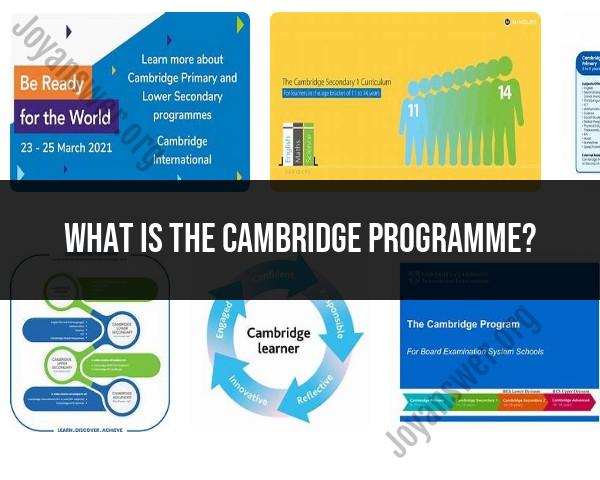What is the Cambridge Programme?
The Cambridge Programme, often referred to as the Cambridge International Programme, is a comprehensive and internationally recognized education system offered by the University of Cambridge. This program provides a range of qualifications and educational resources for students and schools worldwide. Here's what you need to know about the Cambridge Programme:
Wide Range of Qualifications:
The Cambridge Programme offers a variety of educational qualifications that cater to different age groups and academic levels, including:
Cambridge Primary: For students aged 5 to 11, it provides a strong foundation in core subjects like English, Mathematics, and Science.
Cambridge Secondary 1: Designed for students aged 11 to 14, it continues to build upon core subjects and introduces other subjects.
Cambridge Secondary 2 (IGCSE): This is a globally recognized qualification typically taken at age 16, covering a wide range of subjects.
Cambridge Advanced (AS and A-levels): These qualifications are usually taken by students aged 16 to 19. They offer in-depth study of subjects and are recognized by universities globally.
Cambridge Pre-U: An alternative to A-levels, providing a broad and deep study of subjects.
Global Recognition:
Cambridge qualifications are highly respected and recognized by universities and employers worldwide. They are often seen as a benchmark of academic excellence and are widely accepted for university admissions.
Teaching and Learning Approach:
The Cambridge Programme emphasizes active and inquiry-based learning. It encourages students to develop critical thinking, problem-solving skills, and a strong understanding of the subjects they study. The approach promotes holistic development beyond rote memorization.
Assessment Methods:
Assessment in the Cambridge Programme typically involves a combination of coursework and examinations. This approach assesses not only knowledge but also the application of knowledge, critical thinking, and problem-solving skills.
Flexibility and Choice:
At the advanced levels (A-levels and Pre-U), students have the flexibility to choose subjects of interest, allowing for a more personalized and tailored curriculum. This flexibility can be valuable for students with specific academic interests.
Global Availability:
The Cambridge Programme is offered in over 160 countries, making it accessible to a diverse range of students worldwide. Many schools, both public and private, choose to offer Cambridge qualifications.
Teacher Support and Development:
Cambridge provides training and support for teachers to help them deliver the program effectively. This support includes resources, workshops, and professional development opportunities.
Resources for Schools:
Schools implementing the Cambridge Programme receive access to educational resources, guidance, and support to facilitate the delivery of the program.
The Cambridge Programme is often chosen by schools and students seeking a high-quality international education with a focus on critical thinking, problem-solving, and academic excellence. It offers a clear pathway from primary education to university admission, making it a comprehensive educational system.
The Cambridge Programme: An Overview
The Cambridge Programme is a highly regarded international curriculum that offers students a rigorous and challenging academic experience. It is designed to help students develop the knowledge, skills, and values they need to succeed in the 21st century.
The Cambridge Programme is offered in over 10,000 schools in over 160 countries, making it one of the most widely used international curricula in the world. Students who complete the Cambridge Programme are well-prepared for university and for success in their future careers.
Educational Excellence with the Cambridge Programme
The Cambridge Programme is known for its academic excellence. Students who complete the program are challenged to think critically, solve problems, and communicate effectively. They also develop a deep understanding of the subjects they study.
The Cambridge Programme is also designed to help students develop their personal and social skills. Students learn how to work collaboratively, resolve conflict peacefully, and be responsible citizens.
Curricular Framework and Standards in Cambridge Education
The Cambridge Programme is based on a clear curricular framework and set of standards. This ensures that students receive a high-quality education, regardless of where they are in the world.
The Cambridge curriculum is divided into three stages: Primary, Lower Secondary, and Upper Secondary. Each stage has its own specific learning objectives and assessment criteria.
The Cambridge curriculum is also designed to be flexible. Schools can choose the subjects that they want to offer and adapt the curriculum to meet the needs of their students.
Benefits of Participating in the Cambridge Programme
There are many benefits to participating in the Cambridge Programme. Some of the key benefits include:
- Academic excellence: The Cambridge Programme is known for its academic excellence. Students who complete the program are well-prepared for university and for success in their future careers.
- Global recognition: The Cambridge Programme is recognized by universities and employers around the world. Students who complete the program have a wide range of options for their future education and employment.
- Holistic development: The Cambridge Programme focuses on the holistic development of students. Students learn how to think critically, solve problems, work collaboratively, and be responsible citizens.
- Flexibility: The Cambridge curriculum is designed to be flexible. Schools can choose the subjects that they want to offer and adapt the curriculum to meet the needs of their students.
Preparing Students for Success with Cambridge
There are a number of things that schools can do to prepare students for success with the Cambridge Programme. These include:
- Providing students with a strong foundation in the core subjects of English, mathematics, and science.
- Developing students' critical thinking and problem-solving skills.
- Encouraging students to be independent learners.
- Providing students with opportunities to work collaboratively and to practice their communication skills.
- Creating a positive learning environment where students feel supported and challenged.
The Cambridge Programme is a powerful tool that can help students achieve their full potential. By participating in the program, students can develop the knowledge, skills, and values they need to succeed in the 21st century.












